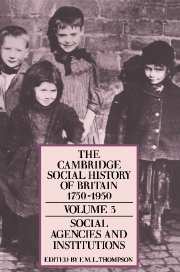Book contents
8 - Clubs, societies and associations
Published online by Cambridge University Press: 28 March 2008
Summary
When in 1837, in the pages of his first periodical, Master Humphrey's Clock, Charles Dickens celebrated the doings of the Mudfog Association, with all its little formalities, its concern for rules, and its sense of importance and purpose, he was recording one of the most pervasive, diffuse and amorphous social developments of the past 200 years. The creation of formal voluntary associations was not new in his generation but what was new was the increase in their number, variety and public importance which took place, especially after 1780. That increase was to continue for many decades. The basis of that growth was in the adult male urban middle classes, but this adaptable and flexible form of social institution could never and was never limited to this group.
As society became more complex, those with power, those with no power and above all those with slender fragments of power which they sought to defend and extend began to organise themselves in a variety of specific ways. A whole new series of words came into common use in the English language, often changing or adding to their meaning – the association, the society, the chairman, the agenda, the membership, the rules and constitution and the annual report. After the mid-eighteenth century voluntary organisations appeared in increasing numbers. Their defining characteristics were minimal, a set of rules, a declared purpose and a membership defined by some formal act of joining. These organisations acted independently of the family, household, neighbourhood, firm or work group.
- Type
- Chapter
- Information
- The Cambridge Social History of Britain, 1750–1950 , pp. 395 - 444Publisher: Cambridge University PressPrint publication year: 1990
References
- 28
- Cited by



